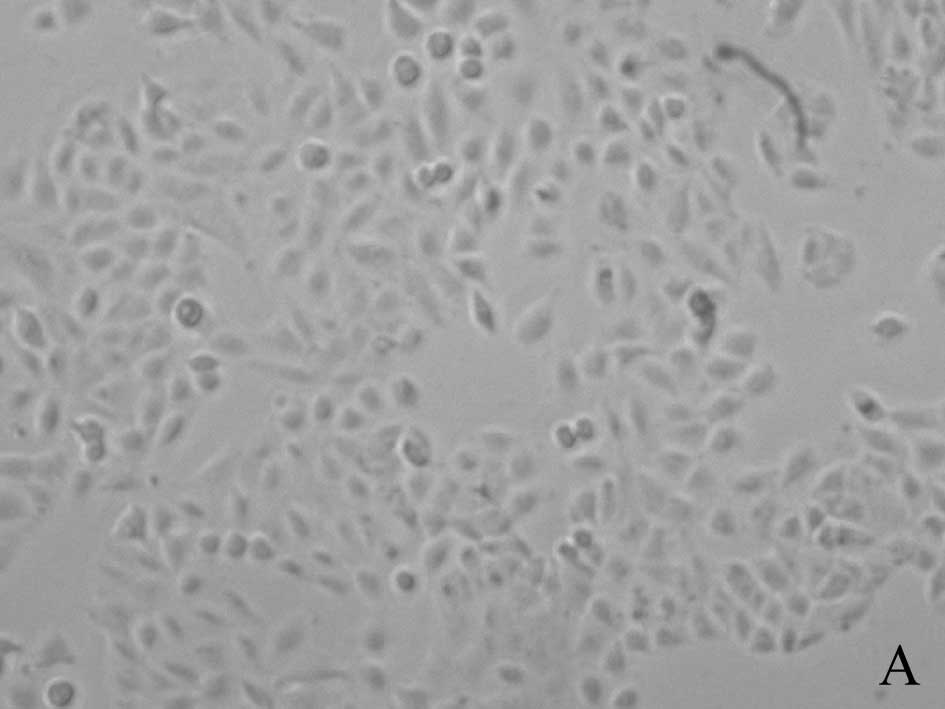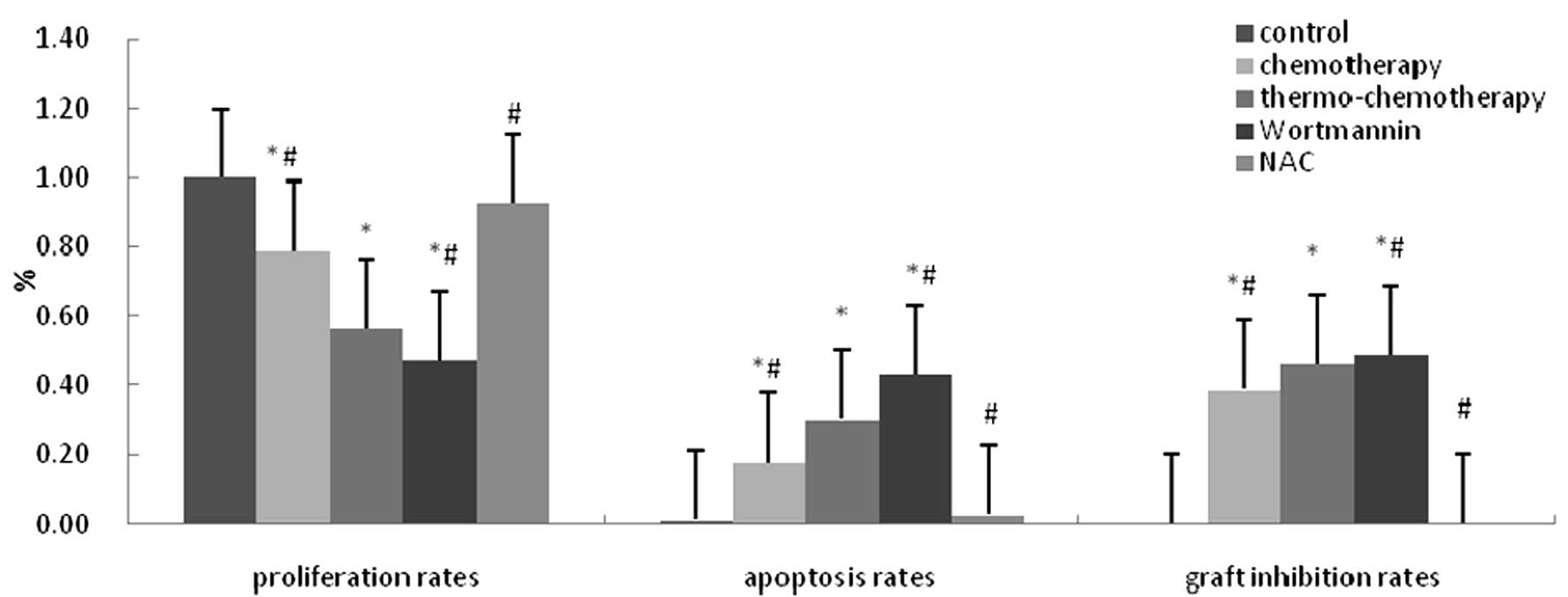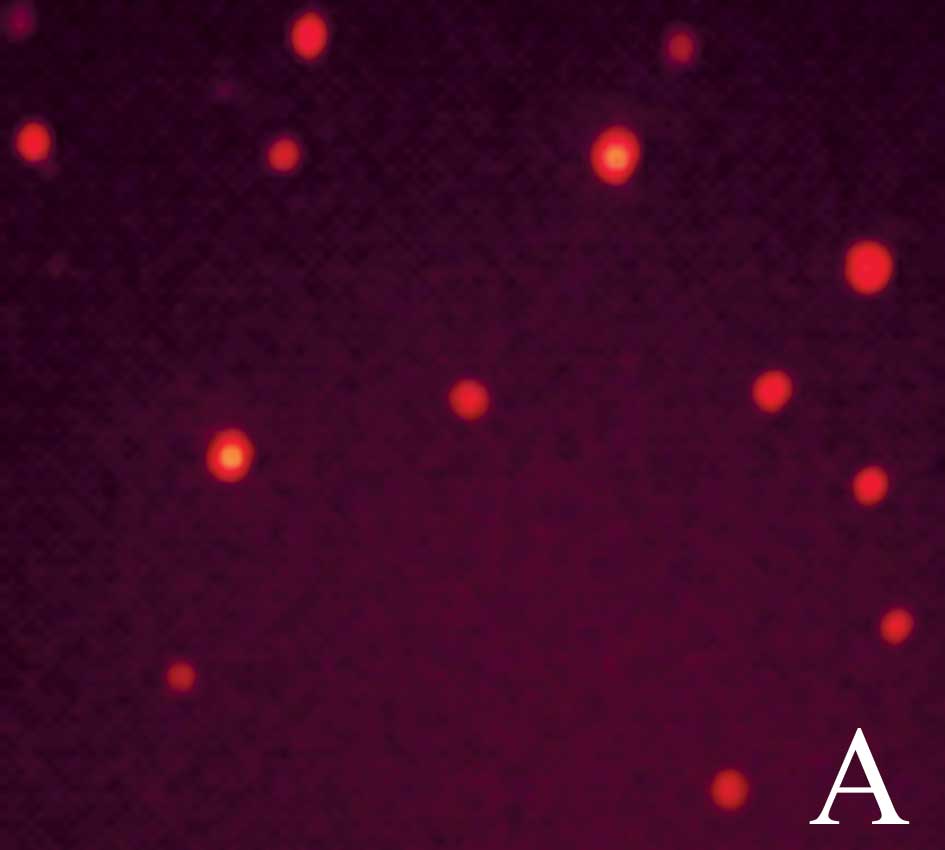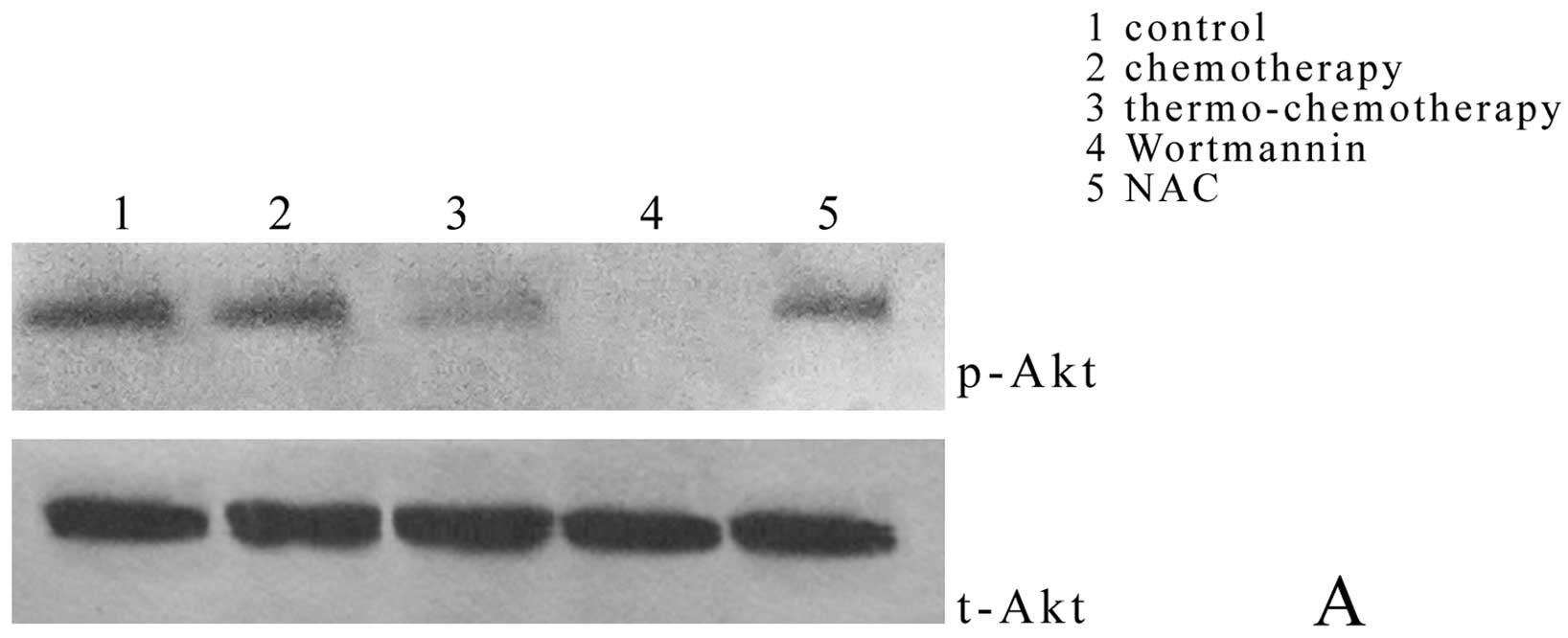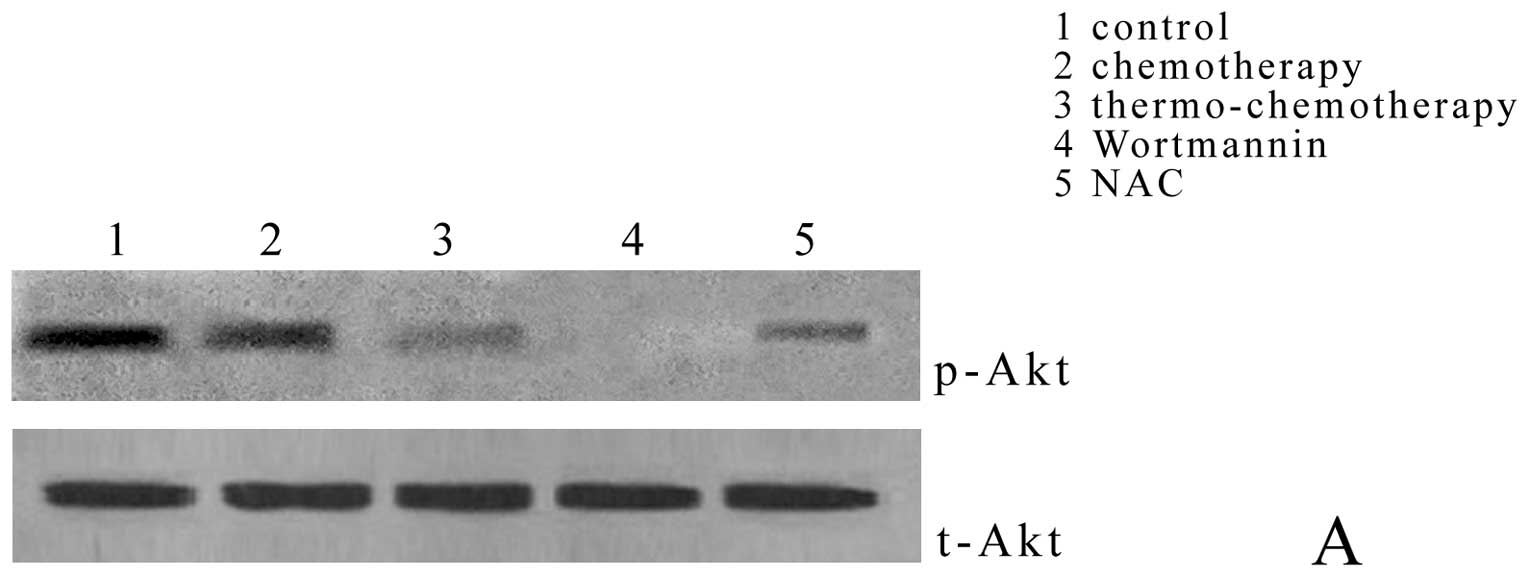|
1
|
Yin WB, Yu ZH, Xu GZ and Hu YM: Radiation
Oncology. Fourth Edition. Peking Union Medical College Press; pp.
307–321. 2008
|
|
2
|
Lu H and Chen LB: Hyperthermia combined
with other therapies for cancer therapy. Postgrad Med J.
17:458–460. 2004.
|
|
3
|
Verwaal VJ, van Tinteren H, Ruth SV and
Zoetmulder FA: Toxicity of cytoreductive surgery and hyperthermic
intra-peritoneal chemotherapy. J Surg Oncol. 85:61–67. 2004.
View Article : Google Scholar : PubMed/NCBI
|
|
4
|
Bakhshandeh A, Bruns I, Traynor A, et al:
Ifosfamide, carboplatin and etoposide combined with 41.8 degrees C
whole body hyperthermia for malignant pleural mesothelioma. Lung
Cancer. 39:339–345. 2003. View Article : Google Scholar : PubMed/NCBI
|
|
5
|
Wang JH, Yao MZ, Zhang ZL, Zhang YH, Wang
YG and Liu XY: HSF1 blockade-induced tumor thermotolerance
abolishment is mediated by JNK-dependent Caspase-3 activation.
Biochem Biophys Res Commun. 321:736–745. 2004. View Article : Google Scholar : PubMed/NCBI
|
|
6
|
Pletjushkina OY and Fetisova EK: Hydrogen
peroxide produced inside mitochondria takes part in cell-to-cell
transmission of apoptotic signal. Biochemistry. 71:60–67.
2006.PubMed/NCBI
|
|
7
|
Cheng Y, Chang LW and Tsou TC:
Mitogen-activated protein kinases mediate arsenic-induced
down-regulation of survivin in human lung adenocarcinoma cells.
Arch Toxicol. 80:310–318. 2006. View Article : Google Scholar : PubMed/NCBI
|
|
8
|
Hamdi M, Kool J, Cornelissen-Steijger P,
et al: DNA damage in transcribed genes induces apoptosis via the
JNK pathway and the JNK-phosphatase MKP-1. Oncogene. 24:7135–7144.
2005. View Article : Google Scholar : PubMed/NCBI
|
|
9
|
Vizio B, Poli G, Chiarpotto E and Biasi F:
4-hydroxynonenal and TGF-beta1 concur in inducing antiproliferative
effects on the CaCo-2 human colon adenocarcinoma cell line.
Biofactors. 24:237–246. 2005. View Article : Google Scholar : PubMed/NCBI
|
|
10
|
Wen KC, Shih IC, Hu JC, Liao ST, Su TW and
Chiang HM: Inhibitory effects of terminalia catappa on UVB-induced
photodamage in fibroblast cell line. Evid Based Complement Alternat
Med. 2011:9045322011.PubMed/NCBI
|
|
11
|
Shi XY, Cai XJ, Lei JX, Cao FJ, Pan DF and
Chen P: Reversal effect of PI-3K/Akt pathway inhibitor LY294002 on
multidrug resistance of ovarian cancer cell line A2780/Taxol. Ai
Zheng. 27:343–347. 2008.(In Chinese).
|
|
12
|
Manning BD and Cantley LC: AKT/PKB
signaling: navigating downstream. Cell. 129:1261–1274. 2007.
View Article : Google Scholar : PubMed/NCBI
|
|
13
|
Wang J, Miao LJ, Wu YM, Wu YJ and Wang XC:
Expression of AKT2, cyclin D1, and MMP-9 and their correlations to
clinicopathologic features of non-small cell Lung cancer. Ai Zheng.
25:69–72. 2006.(In Chinese).
|
|
14
|
Zhuang QY, Chen XG, Dong ZQ, Liu JH and Ye
ZQ: Effects of rapamycin on prostate cancer PC-3 cells. Ai Zheng.
28:851–855. 2009.(In Chinese).
|
|
15
|
Lee MJ, Chen HM, Tzang BS, Lin CW, Wang
CJ, Liu JY and Kao SH: Ocimum gratissimum aqueous extract protects
H9c2 myocardiac cells from H(2)O(2)-induced cell apoptosis through
Akt signalling. Evid Based Complement Alternat Med.
2011:5780602011.PubMed/NCBI
|
|
16
|
Johnson GL and Lapadat R:
Mitogen-activated protein kinase pathways mediated by ERK, JNK and
p38 protein kinases. Science. 298:1911–1912. 2002. View Article : Google Scholar : PubMed/NCBI
|
|
17
|
Gao S, Wang L, Wu WD and Zhou F:
Synergistic effect of thermotherapy in combination with
chemotherapy on lung tumor A549 cells growth through activation of
c-Jun N-terminal kinase and inhibition of heat shock protein70
expression. Wei Sheng Yan Jiu. 37:529–532. 2008.(In Chinese).
|
|
18
|
Patel S, Sanborn RE and Thomas CR Jr:
Definitive chemoradiotherapy for non-small cell lung cancer with N2
disease. Thorac Surg Clin. 18:393–401. 2008. View Article : Google Scholar : PubMed/NCBI
|
|
19
|
Hiraoka M, Masunaga S, Nishimura Y, et al:
Regional hyperthermia combined with radiotherapy in the treatment
of lung cancers. Int J Radiat Oncol Biol Phys. 22:1009–1014. 1992.
View Article : Google Scholar : PubMed/NCBI
|
|
20
|
Yan W, Arai A, Aoki M, Ichijo H and Miura
O: ASK1 is activated by arsenic trioxide in leukemic cells through
accumulation of reactive oxygen species and may play a negative
role in induction of apoptosis. Biochem Biophys Res Commun.
355:1038–1044. 2007. View Article : Google Scholar : PubMed/NCBI
|
|
21
|
Alexandre J, Batteux F, Nicco C, et al:
Accumulation of hydrogen peroxide is an early and crucial step for
Paclitaxel-induced tumor cell death both in vitro and in vivo. Int
J Cancer. 1:41–48. 2006. View Article : Google Scholar : PubMed/NCBI
|
|
22
|
Jo PG, Choi YK and Choi CY: Cloning and
mRNA expression of antioxidant enzymes in the pacific oyster,
crassostrea gigas in response to cadmium exposure. Comp Biochem
Physiol C Toxicol Pharmacol. 147:460–469. 2008. View Article : Google Scholar : PubMed/NCBI
|
|
23
|
Cho SD, Li G, Hu H, et al: Involvement of
c-Jun N-terminal kinase in G2/M arrest and caspase-mediated
apoptosis induced by sulforaphane in DU145 prostate tumor cells.
Nutr Cancer. 52:213–224. 2005. View Article : Google Scholar : PubMed/NCBI
|
|
24
|
Hirano H, Tabuchi Y, Kondo T, et al:
Analysis of gene expression in apoptosis of human lymphoma U937
cells induced by heat shock and the effects of alpha-phenyl
N-tert-butylnitrone (PBN) and its derivatives. Apoptosis.
10:331–340. 2005. View Article : Google Scholar : PubMed/NCBI
|
|
25
|
Foster K, Wang Y, Zhou D and Wright C:
Dependence on PI3K/Akt signaling for malignant rhabdoid tumor cell
survival. Cancer Chemother Pharmacol. 63:783–791. 2009. View Article : Google Scholar : PubMed/NCBI
|
|
26
|
Chin YR and Toker A: Function of Akt/PKB
signaling to cell motility, invasion and the tumor stroma in
cancer. Cell Signal. 21:470–476. 2009. View Article : Google Scholar : PubMed/NCBI
|
|
27
|
Kobayashi I, Semba S, Mat suda Y, Kuroda Y
and Yokozaki H: Significance of Akt phosphorylation on tumor growth
and vascular endothelial growth factor expression in human gastric
carcinoma. Pathobiology. 73:8–17. 2006. View Article : Google Scholar : PubMed/NCBI
|
|
28
|
Noske A, Kaszubiak A, Weichert W, et al:
Specific inhibition of AKT2 by RNA interference results in
reduction of ovarian cancer cell proliferation: increased
expression of AKT in advanced ovarian cancer. Cancer Lett.
246:190–200. 2007. View Article : Google Scholar : PubMed/NCBI
|
|
29
|
Tsurutani J, West KA, Sayyah J, Gills JJ
and Dennis PA: Inhibition of the phosphatidylinositol
3-kinase/Akt/mammalian target of rapamycin pathway but not the
MEK/ERK pathway attenuates laminin-mediated small cell lung cancer
cellular survival and resistance to imatinib mesylate or
chemotherapy. Cancer Res. 65:8423–8432. 2005. View Article : Google Scholar
|
|
30
|
Okun I, Balakin KV, Tkachenko SE and
Ivachtchenko AV: Caspase activity modulators as anticancer agents.
Anticancer Agents Med Chem. 8:322–341. 2008. View Article : Google Scholar : PubMed/NCBI
|
|
31
|
Vertrees RA, Das GC, Popov VL, et al:
Synergistic interaction of hyperthermia and gemcitabine in lung
cancer. Cancer Biol Ther. 4:1144–1153. 2005. View Article : Google Scholar : PubMed/NCBI
|
|
32
|
Dogra C, Changotra H, Wergedal JE and
Kumar A: Regulation of phosphatidylinositol 3 kinase (PI3K)/Akt and
nuclear factor kappa B signaling pathways in dystrophin-deficient
skeletal muscle in response to mechanical stretch. J Cell Physiol.
208:575–585. 2006. View Article : Google Scholar : PubMed/NCBI
|
|
33
|
Zheng XW, Li Y, Tang FA, Ma J, Zheng PY
and Lu GF: In vivo antitumor effect of canstatin gene on human
esophageal carcinoma xenografts in nude mice. Ai Zheng. 28:350–355.
2009.(In Chinese).
|















